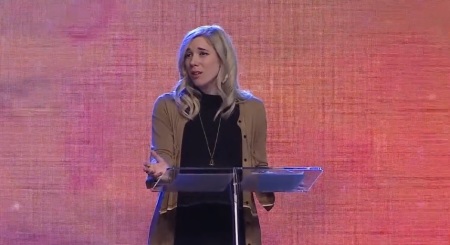Urbana Missions Conference: How a silly idea became a godly force to fight sex trafficking

A love for dresses and fashion, Instragram, and a passion for justice combined with God's redemptive power was just the prescription for raising millions of dollars to combat international sex trafficking.
In a talk before thousands gathered for the Urbana Student Missions Conference last week in St. Louis, Missouri, Blythe Hill, founder of the Dressember Foundation, explained how God takes our silly ideas, interests, pains and tragedies to transform them into something great for His Kingdom.
Upon realizing the breadth and scope of the global sex trade, she knew she had to be a part of the fight to dismantle it, Hill said. The fight was personal to her, particularly because she was sexually molested during her youth.
"Do I matter? Am I disposable? Can someone love me?" she asked, recounting the questions that plagued her following the abuse.
"It took years for me to heal, and forgive and move forward."
Yet when she hears about the ongoing scourge of trafficking her resolve only continues to grow. She had to come to a place where she believed the same truths about the injustice she was combating — namely, that it's not the victim's fault and that they have no duty to carry their shame — had to also be true for her regarding her own experience.
"When you shine a light on shame it starts to lose its power," she said.
As she shared her story and struggle with friends, counselors, and pastors, the shame indeed began to fade for her.
But Hill struggled to know what she could do about fighting the global sex trade given that her interests didn't line up with the kind of people who were engaged in the fight to end it, like lawyers, psychologists, advocates. She was interested in fashion and creative writing. While she felt passionately about standing up against sexual exploitation of vulnerable women and girls, she also felt powerless in light of the problem's size and scope.
In 2009 everything started to change.
She tried a personal style challenge to give herself a creative break from the academic intensity of her studies during the month of December, calling it "Dressember" where she wore a dress every day of the month. She thought she would never do that again but ended up doing it with a few friends the following year. Several friends of her friends wanted in on it and an even larger group participated the year after that.
In 2013, she aligned Dressember with International Justice Mission in an effort to raise $25,000 to fight sex trafficking. They posted the photos of themselves sporting their dresses on Instagram and quickly surpassed their fundraising goal, raising $165,000. From there they only continued to gain momentum, raising $2 million in 2017. In five years they have raised over $5 million.
Hill went on to talk about Miriam, a girl she met in the Dominican Republic whose mother sold her to a trafficker for drug money. When IJM found her she was working the streets of Santo Domingo, and was five months pregnant at age 15. IJM spearheaded an effort to investigate what happened, rescue her from the sex trade, and represent her in court.
Hill met Miriam when she was 17. Yet Instead of being weighed down with the betrayal and the trauma of what happened Miriam seemed "puzzlingly joyful," she said.
"Miriam's story doesn't stop at her abuse, it doesn't center on her abuse. It is continuing. It is bending toward redemption," Hill said.
"It's human nature to look any injustice in the face and feel totally inadequate," she said. "But I saw what I thought was a silly idea create this community of like-minded community across the world, who together are stirring global change."
"I saw my idea outgrow me to the point where I had to run to keep up with the size of it."
No matter how odd the interests, God can take them to do something great with them, she told the students. He is so creative to take a silly idea to spark a global movement.
She also urged the students to consider disappointments in a fresh way.
"What we often do is weave together these false narratives about our big disappoints and big pains and all the tiny disappointments. And we write these narratives for ourselves that just aren't true. Narratives like 'I'm a failure;' 'I'm not worthy of love;' 'God is upset with me;' 'everyone will eventually leave,' " Hill said.
"For years I hid my shame when it was the key to my calling. The things you think are a liability in your life may actually be an asset."
She added: "We like things to be clean, and linear and it makes sense to us that when we get our act together then well bear fruit. Then well be useful to God."
But the Bible says God's grace is sufficient and that His strength is made perfect in weakness, she said, referencing 2 Corinthians 12.
"And sometimes you need to get outside your bubble to see how your heart breaks."
God doesn't just break our hearts for brokenness but to call us, she said.
"So pay attention to the brokenness and then ask Now what, God?"





















